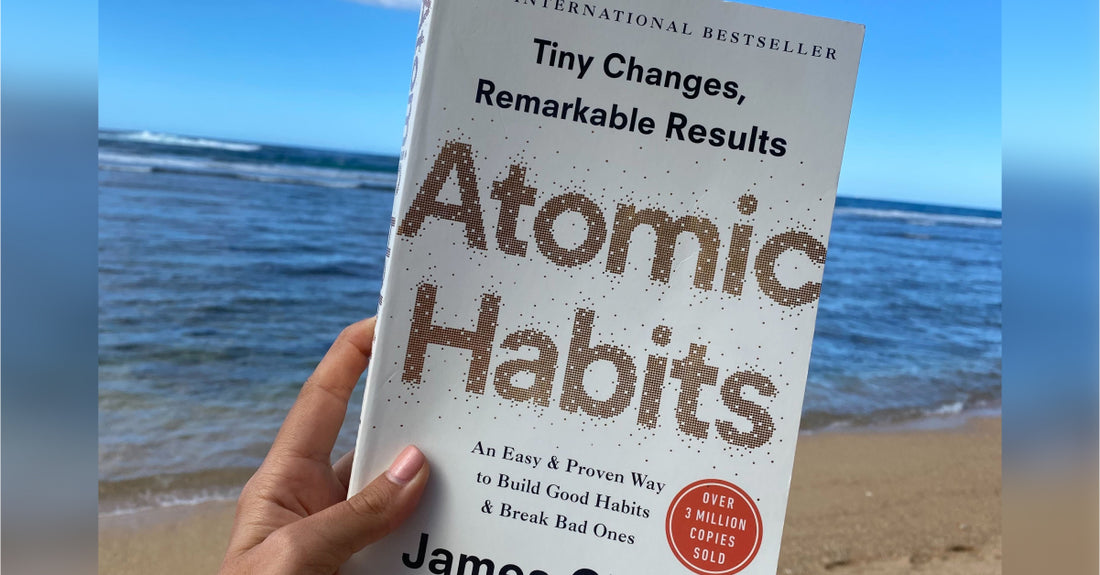Dr. Raghu Appasani, MUD\WTR’s Mental Health Advisor, is an integrative psychiatrist, neuroscientist and social entrepreneur focused on bridging the gap between Western and Eastern practices through a proactive approach to health. During MUD\WTR’s book club community event, Appasani offered advice on Atomic Habits by James Clear, including what he thinks Clear left out when discussing habits.
There’s a Biological Reason Why Forming Good Habits Can Be Both Exciting and Scary
When we try to create a new habit, like reading a book instead of watching TV, there’s a sense of excitement tinged with anxiety. Some of it’s mental—Do I have what it takes to show up for myself? And some of it’s physical— the body prefers to conserve energy through automatic behaviors rather than the slower, more effort-filled change process. Excitement and fear are intertwined in our physiology. Whether we’re eager or anxious, adrenaline courses through our bodies. The distinction is not in how our bodies react but how we interpret our experiences.
We’re hard-wired to resist change that our bodies view as a threat. Change is a step into the unknown, which both inspires and terrifies us. For this reason, it can be helpful to start with small changes. Clear chose the word “atomic” to describe the impact of tiny changes. To him, “atomic” can mean small, like an atom. But like an atom, he says change can also be “fundamental to a larger system” and “a source of immense energy or power.”
In other words, a small change can have a significant effect. To experience these effects, you can’t just want change. You have to make changes. Unfortunately, we’re often met with resistance when making even the most minor shifts because of the way our brains are hard-wired. Lucky for us, Dr. Appasani has some advice for converting our motivation into life-changing actions.
What Is the Main Point of James Clear's Atomic Habits book and Why Is Compassion Important?
The Atomic Habits book offers advice on how to break harmful patterns and adopt healthy habits. Countless readers have used Clear's four steps to develop small, incremental routines that eventually become significant, positive changes. But what happens when we don’t meet our goals after the first try? Or even the second or third attempts? Perceived failure can feel demotivating, making new routines even more challenging. Appasni has a method for getting out of a habit-forming slump. He recommends acknowledging our efforts and suggests we offer ourselves compassion.
According to Appasani, science supports the benefits of acknowledging and being grateful for our efforts. “It will keep you motivated to keep achieving and moving forward,” he said.
This wisdom rings true regardless of how much we accomplish. Whether we meet our goals or not, Appasani encourages us to extend “forgiveness and gratitude” to ourselves whenever we don’t meet our goals. He also says it’s important to keep trying, “even if there's one or two days or three days that you didn't achieve what you wanted to achieve, or you didn't do the habit.” Appasani added that giving ourselves grace can help us stay present, regroup and try again later. “You can regain control and empowerment for the next moment,” said Appasani.
Slowing Down Is the Key to Making Good Habits Stick
We often experience a lot of pressure from the world to make positive changes fast. We may feel pressure from parents, peers, or social media to go harder and be better, faster and stronger. Appasani acknowledges this can feel “overwhelming and bombarding” and make it easy to “just give up on it all and not want to do any of it.”
So how do we find the balance between reaching for our dreams and knowing when to rest? Appasani says that the key to this balance is slowing down and noticing how we feel.
“What I would challenge people to do is, as you incorporate these habits, slow it down a little bit and start to feel what's in your body,” said Appasani. “Whether that's your meditation practice or something as simple as just pausing for 10 seconds and doing a body scan to feel where you're feeling tension or anxiety, or moments of joy and gratitude.”
Appasani also suggests checking in with yourself to see if your habits align with your goals or if they result from pressure from the people around you. He says we should ask ourselves, “Am I excited about this endeavor and the possibility of how I will be on the other side of it? Is it contributing to my value system and the person I want to be? Or am I trying to do it because I need to keep up with the rest of the community?”
Whether we’re having a hard time sleeping and our habit goals involve creating better nighttime routines, or we’re doom-scrolling on social media and want to put down our devices and pick up a book, taking time to check in with ourselves is key to understanding when to keep pushing forward and when to pause or reset. All the while, offer yourself some grace and gratitude. Between the tips in James Clear’s Atomic Habits book and Dr. Appasani’s kind advice, the MUD\WTR fam can ease into slow, steady, compassionate change.
Sara Russell is a relationship coach and the host of the Trends w/ Benefits Podcast.
Read More: Tips to Build Better Habits and Get Comfortable Failing
Read More: What Makes Healthy Habits Stick?
Read More: Atomic Habits: The Best Self-Help Book Of My Year




